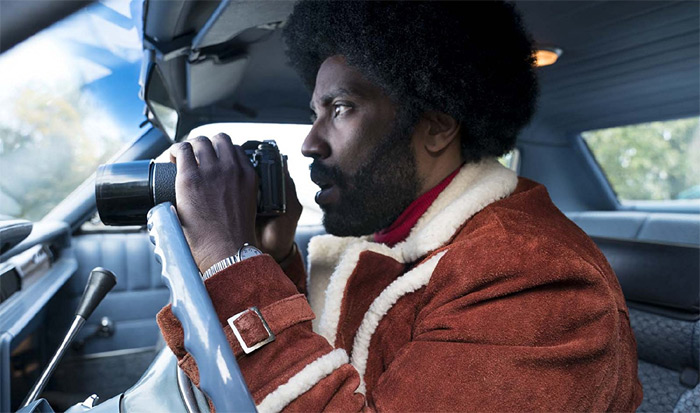Directed by Spike Lee
Picturehouse, Liverpool
From 24th August 2018
Reviewed by Nick Daly
The trailer for Spike Lee’s BlacKkKlansman promised a sort of funky, uproarious racial satire, but the film itself, about an African-American’s attempt to infiltrate the Klu Klux Klan, has a satirical edge that’s much sharper than it appears.
“Based on some fo’ real, fo’ real shit” (as is whimsically stated at the beginning of the film), Ron Stallworth (played with an effortless subtlety by John David Washington, son of Denzel) is the first African-American cop at Colorado Springs Police Department in the early 70’s. Dissatisfied with his position, he requests a transfer to go undercover, and rather casually calls up the Klu Klux Klan as a white man wishing to join the ‘organisation’. Being black, however, is a problem, and so he recruits his Jewish co-worker, Flip Zimmerman (an always watchable Adam Driver) to be the ‘white Ron Stallworth’ face-to-face while he continues to make arrangements over the phone. Alongside this, Ron strikes up a charming relationship with black student union president Patrice Dumas (a charismatic and beautiful Laura Harrier), which sits nicely besides the main plot as she and her community increasingly become a target by the Klan.
It’s a finely paced, suspense-filled narrative, and it’s fascinating to watch Zimmerman nestling into the Klan by imitating their abhorrent behaviour, jeopardising his safety as one member edges closer to revealing his identity. Interspersed throughout is thought-provoking dialogue such as an interesting parallel between the police force and Klan itself, with both being like a “family who stick together, right or wrong.” The plot does, however, edge towards conventionality as the film approaches its end, with continually ranked-up tension and slight plot contrivances making you question what is fabricated for dramatic purposes and how true this “fo’ real shit” actually is.
A prominent moment in the film, where a Klan ceremony is juxtaposed with a speech in a black community conjures a powerful and well-crafted sequence, as intense chants of “white power” and “black power” from each side are dramatically intercut with each other. If the racial tension sounds a little too tense, and you’re questioning how helpful this film really is in the current climate, the underlying and unifying message of “all power to all of the people” is a phrase that reoccurs throughout, and not forgetting, of course, that the plot consists of two races working together to eradicate racial hate.
Spike Lee is often regarded as a ‘master of tone,’ and after watching BlacKkKlansman it’s clear to understand why. The truth is a film involving white supremacists cannot remain funny for too long, but despite the shocking nature of the Klan, the film’s inserts of humour never feel jarring and it’s entertainment value is never lost. Uncomfortable scenes sit seamlessly alongside its playful ones, and it takes a skilled director to balance the two extremities and make it work, especially with the delicate subject of race as a backdrop.
Jordan Peele, the director of last year’s Get Out, produced BlacKkKlansman and actually came to Lee with the idea, and the comedian-turned-director’s fingerprints are evident. Both films are racial satires that share the same blend of horror and comedy elements. Comparing them, however, BlacKkKlansman feels like a stronger film, with a stylistic flourish from Lee that befits the nature of this new sub-genre. Furthermore, whereas Get Out fully indulged in its satirical aspects to the point of absurdity, BlacKkKlansman has a more restrained response that allows its message to be much more effective.
In fact, with its fearlessly controversial subject matter, off-kilter humour and stylisations (Lee frequently throws up random title cards and posters that momentarily take you out of the film), the film draws similarities with a Tarantino film, with the only aspect missing being extreme violence (the comparison is ironic given the director’s famous feud, in which Lee criticised Tarantino for his use of black culture in his films). The film’s final act is the most notable example, where most of the characters are confined to a small space; a frequent staple Tarantino films. Tensions steadily rise as true identities are unearthed and, to give it more in common with films like Inglourious Basterds and Django Unchained, there’s even explosives involved. In a sense, it feels like the racially-charged film Tarantino attempted to create with Django Unchained, with Ron Stallworth being the hero for young African-Americans that Tarantino tried to conceive with the lukewarm character of Django. Hopefully the directors venture into the 70’s with next years Once Upon A Time In Hollywood is more successful.
In another Tarantino-esque scene, Ron and Patrice are discussing black films of the era. After Patrice discredits one that he mentions, Ron replies with “come on, it’s only a movie,” and subsequently raises the debate of the importance of film and if it should be taken seriously. As stated earlier, BlacKkKlansman plays with this notion itself by flitting between horror and humour, from being an entertaining undercover caper to a film with something important it wants to say. Can film really wield that much power?
Just incase the viewer is in any doubt, Lee ends his film with unflinching and unedited footage of the Charlottesville attack, where a car ploughs into counter-protesters at a white supremacists rally. It reinforces the sad truth that BlacKkKlansman may be a film set in the early 70’s (and filtered with references to the era throughout), but it’s not really a period film. A final image of an upside down American flag that gradually turns black and white further solidifies the director’s point, and you leave the cinema entertained but also reflective and thinking, and what more could you possibly want from a cinema ticket?
